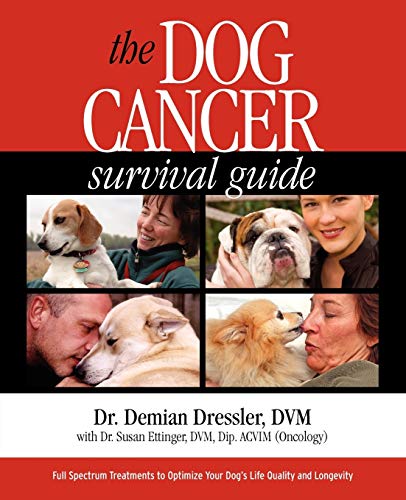Cancer is a tough diagnosis for any dog owner, with about 1 in 4 dogs getting cancer at some point. While treatments like surgery, chemotherapy, and radiation are common, supplements can be key in supporting your dog’s health and well-being. This guide will look at different supplements that could help dogs with cancer. We’ll cover their benefits, how much to give, and possible side effects. By knowing these options, pet owners can work with vets to create a full plan for their dog’s cancer care.
Key Takeaways
- Cancer affects up to 25% of dogs, with a 50% risk for dogs over 10 years old.
- Supplements can support dogs with cancer, even without conventional treatments.
- Omega-3 fatty acids, medicinal mushrooms, and herbs like turmeric may have anti-cancer and immune-boosting properties.
- Gut health is crucial for dogs with cancer, with supplements targeting the microbiome.
- Pet owners should work closely with veterinarians to integrate supplements into a comprehensive cancer care plan.
Table of Contents
What are Supplements for Dogs with Cancer?
When a dog gets cancer, pet owners look for natural ways to help. They use supplements to support their pets during treatment. These supplements aim to improve the dog’s health and happiness. They include things like omega-3 fatty acids and medicinal mushrooms.
Overview of Supplements Used for Canine Cancer Support
Some popular supplements for dogs with cancer are:
- Omega-3 fatty acids
- Medicinal mushrooms (e.g., chaga, reishi, shiitake, turkey tail)
- Ashwagandha
- Traditional Chinese herbal formulas
- Green tea extract
- Milk thistle
- Turmeric
- Lactoferrin
- CBD (cannabidiol)
Benefits of Using Supplements for Dogs with Cancer
Using these supplements can help dogs with cancer in many ways. They can boost the immune system, reduce inflammation, and even fight cancer cells. These supplements support the dog’s health and can lessen the side effects of treatment.
This can make the dog feel better and live a fuller life. It might even help them live longer.
“Using supplements with traditional cancer treatments can change the game for dogs with cancer. These natural options offer important support and can make their lives better.”
For pet owners dealing with canine cancer, supplements offer hope. They give pets the best care and support during a tough time.
Omega-3 Fatty Acids
Omega-3 fatty acids, found in fish oil, are strong anti-inflammatory compounds. They may also help fight cancer directly. Studies show they can lessen infections and radiation side effects in dogs with cancer. These fats are key for a healthy immune system and overall health in dogs with cancer.
Anti-inflammatory and Anticancer Properties
Omega-3s, like EPA and DHA, are studied for fighting inflammation and cancer. They can lessen inflammation and slow cancer cell growth. Adding omega-3s to a dog’s diet may improve symptoms, treatment outcomes, and life quality for dogs with cancer.
Sources and Recommended Dosages
Choosing a high-quality omega-3 supplement is crucial for dogs with cancer. Start with small amounts to avoid stomach upset. The right dose varies by dog size and health condition, usually 20-50 mg per pound of body weight. Fish oil is a top choice for dogs, packed with EPA and DHA.
| Dog’s Weight | Omega-3 Supplement Dosage |
|---|---|
| 10 lbs | 200-500 mg |
| 25 lbs | 500-1,250 mg |
| 50 lbs | 1,000-2,500 mg |
| 75 lbs | 1,500-3,750 mg |
Always talk to your vet before starting any new supplements for your dog. They can help with dosage and check for any medicine interactions.
Medicinal Mushrooms
Pet owners are looking for natural ways to help their dogs with cancer. Medicinal mushrooms like chaga, reishi, shiitake, and turkey tail are gaining attention. These mushrooms have immune-boosting compounds called polysaccharides. Studies show they can help the immune system and may stop cancer cells from growing and spreading in dogs.
Chaga Mushroom for Canine Cancer
Chaga mushroom is full of antioxidants and helps with aging and inflammation in dogs. It’s being studied for its role in fighting canine cancers, like colon and gastric cancer. Chaga may stop cancer cells from forming and help them die, making it a good addition to cancer treatments.
- Organic Chaga mushrooms can help keep your pet healthy by giving their immune system a boost. Organic chaga can help you…
- Organic Chaga mushrooms are a good source of antioxidants, which help to protect your pet’s body from sickness. It’s lik…
- Chaga mushrooms may be able to help your pet feel better if they have sore joints or itchy skin. Organic chaga has joint…

Reishi Mushroom for Pet Cancer
Reishi is known for balancing the immune system and fighting cancer. It has over 400 active compounds that help fight tumors. Adding reishi to a dog’s cancer treatment can make them more responsive to chemotherapy and reduce side effects like nausea.
- Healthy Tails, Happy Days: Strengthen your dog’s immunity w/ our Reishi mushroom extract. Forever Puppy’s dog supplement…
- All Breeds & Sizes: For pets 12 weeks of age and older, our reishi drops for canine immune support keep your furry frien…
- Easily & Invisibly: Simply add our mushroom drops to your dog’s food or water bowl. They won’t even notice the addition …









Shiitake, Turkey Tail, and Other Medicinal Mushrooms
Other mushrooms like shiitake and turkey tail are also being studied for their anti-cancer effects. Shiitake may help fight tumors, while turkey tail can stop tumor growth in different cancers. Using these mushrooms with traditional treatments can improve a dog’s chances of beating cancer.
Adding medicinal mushrooms to a dog’s treatment plan can boost their immune system and fight cancer. But, it’s important to talk to a vet before starting any supplements. They can affect how well other treatments work.
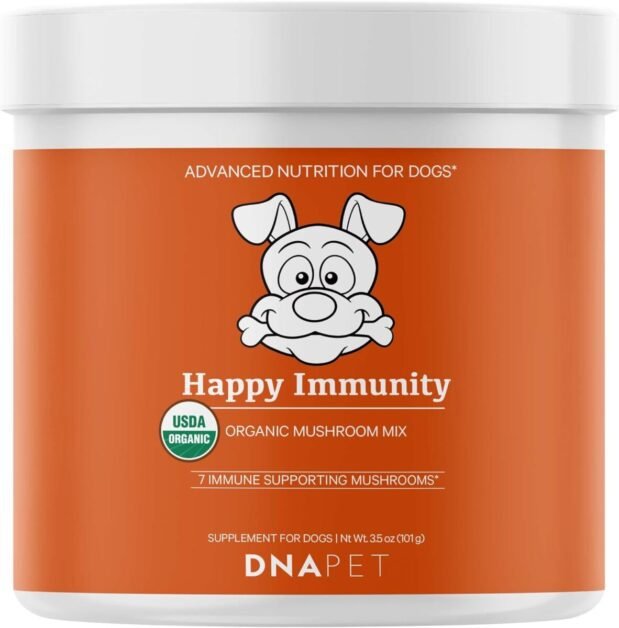

Ashwagandha
Pet owners look for natural ways to help their dogs with cancer. Ashwagandha, also known as Indian ginseng, is a promising Ayurvedic herb. It has been used for centuries to boost well-being and help with stress.
Studies now show ashwagandha might help fight cancer. It has a compound called withaferin that can make cancer cells die. This makes it a good choice for dogs with cancer.
Ashwagandha can also help dogs with cancer in other ways, such as:
- Reducing inflammation and oxidative stress
- Improving energy levels and appetite
- Mitigating the negative effects of adrenal stress
- Supporting the immune system
The safe dose for dogs is 125 to 500 mg of ashwagandha root extract, given twice a day. But, always talk to your vet before starting any new supplements. Ashwagandha can affect some medicines, like sedatives and immunosuppressants.
Even though more research is needed, stories from dog owners are promising. Dogs taking ashwagandha seem to eat better, have more energy, and live better lives. Always watch how your dog reacts and work with your vet to use ashwagandha for dogs with cancer safely and effectively.
- Happy Tails, Happy Days: Bring calmness to your dog with our ashwagandha extract. Forever Puppy’s calming drops promote …
- All Breeds & Sizes: For pets 12 weeks of age and older, our calming drops for dogs with ashwagandha keep your beloved co…
- Easily & Invisibly: Simply add our liquid ashwagandha to your dog’s food or water bowl. They won’t even notice the addit…









Traditional Chinese Veterinary Medicine (TCVM)
Pet owners looking for holistic ways to help their dogs with cancer are turning to Traditional Chinese Veterinary Medicine (TCVM). This approach combines herbal remedies, acupuncture, and more to help dogs feel better. It aims to treat the root cause of a dog’s health issues and boost their overall health.
Common Cancer-Fighting Herbal Formulas
TCVM uses herbal formulas like Hoxsey, Stasis Breaker, HSA, and Xue Fu Zhu Yu Tang to fight cancer in dogs. These formulas mix different herbs to boost the immune system and slow down tumor growth. For example, Stasis Breaker is a mix of six herbs that helps with bone and oral cancers in dogs.
Integrating TCVM Therapies
Adding acupuncture, massage, and special diets to TCVM creates a full approach to cancer care in dogs. Acupuncture can ease pain, increase appetite, and help with healing. This way, pet owners can take care of their dog’s body, mind, and energy.
Even though there’s not much science on TCVM for dog cancer, many owners see good results with it and regular treatments. Always talk to a vet who knows about TCVM to make sure it’s safe and right for your dog.
“Traditional Chinese Medicine (TCM) has been around for over a thousand years and has a long history of use in treating various medical conditions, including cancer. As more research is conducted, we are gaining a better understanding of the potential benefits of incorporating TCVM into a comprehensive cancer care plan for our canine companions.”
Green Tea Extract
Green tea extract is a natural supplement that helps dogs with cancer. It’s full of polyphenol antioxidants. These can slow down the growth and spread of cancer cells.
Antioxidant and Anti-Cancer Properties
Green tea has catechins, especially EGCG, which are strong antioxidants. They protect DNA from damage that can cause cancer. Research shows that green tea extract can stop some cancer cells from growing in lab animals.
It also has other health benefits for dogs with cancer. It can help control blood sugar, blood pressure, and support liver and skin health. These are key for dogs going through cancer treatment.
| Benefits of Green Tea Extract for Dogs with Cancer | Potential Risks and Precautions |
|---|---|
|
|
With a vet’s guidance, green tea extract can be a great supplement for dogs with cancer. It can boost their health. Always talk to your vet before starting any new supplement for your dog.
- Antioxidant Support: Each serving of Wild & Organic green tea extract liquid drops contains 695 mg of green tea leaf for…
- Natural Formula: Our green tea supplement is made with only vegan ingredients, free from GMOs, and contains no artificia…
- Alcohol-Free: Wild & Organic antioxidant supplement with pure green tea extract powder is vegetable glycerin-based, prov…









Milk Thistle
When dogs fight cancer, keeping their liver healthy is key. Milk thistle is a great natural supplement for this. It’s known for its antioxidants and anti-inflammatory effects. This makes it a great choice for dogs with cancer.
Silybin, found in milk thistle, helps protect the liver and regenerates cells. Brands like Marin and Denamarin use silybin to help dogs with liver diseases. Studies show it can help people with liver issues from drinking too much alcohol or Hepatitis C. This suggests it could help dogs with cancer and liver problems too.
Studies in dogs show that silymarin can help after liver damage from toxins. A study on kids with leukemia found it protects liver cells from chemotherapy side effects. This shows milk thistle could be good for dogs with cancer, helping them handle treatments better and keeping their liver healthy.
The right amount of milk thistle for dogs is 20-50 mg of silymarin per kilogram of body weight daily. Denamarin suggests 1.2-4 mg of silybin and 15-38 mg of SAMe per kilogram daily. Marin recommends 1.6-3.1 mg of silymarin per kilogram daily.
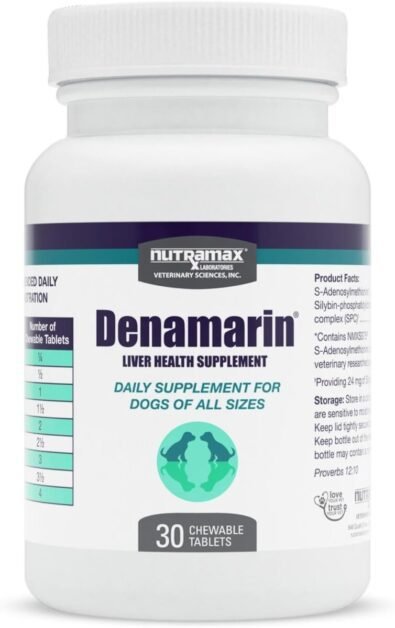

Remember to keep milk thistle in a cool, dry place, out of sunlight, as the package says. While it’s usually safe, talk to your vet before starting it, especially if your dog has cancer. This ensures it’s safe and won’t interact with other treatments.
“Milk thistle has been shown to decrease symptoms and improve laboratory tests in human patients with liver disease, and veterinary studies suggest it may be beneficial for dogs as well.”
Adding milk thistle to a dog’s cancer care can help support the liver and boost cell growth. This can make a big difference in their health during a tough time.
Turmeric
Turmeric is a bright yellow spice from the ginger family. It’s known for its anti-inflammatory and antioxidant properties. This spice is getting more attention for helping dogs with cancer. The key ingredient, curcumin, can stop cancer cells from growing and spreading in lab tests.
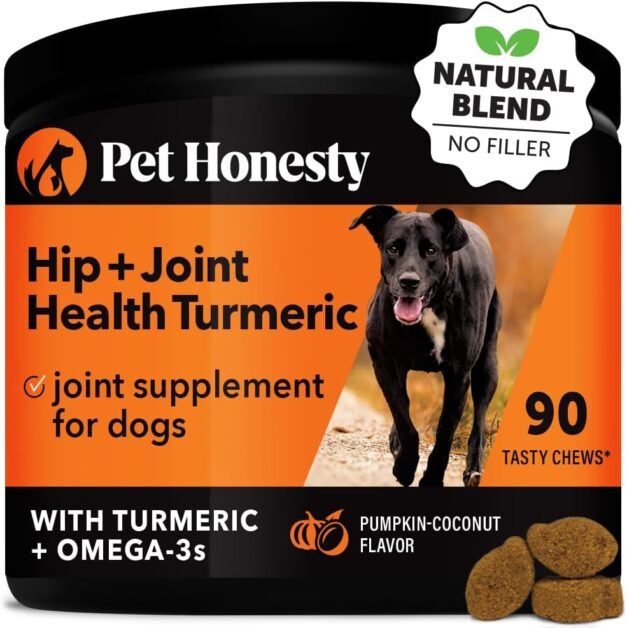

Turmeric’s Anti-Inflammatory and Antioxidant Properties
There have been over 3,000 studies on turmeric in the last 25 years. This shows how much scientists are interested in its health benefits. It’s been used in Ayurvedic medicine for over 3,000 years.
Turmeric oil and curcumin in the plant help reduce inflammation and pain. Curcumin can protect against bladder cancer in rats, showing it might help fight cancer in dogs too. It also makes chemotherapy work better and slows down cancer cell growth.
Creating a Turmeric Golden Paste for Dogs
Many pet owners make a turmeric golden paste at home. It’s made with turmeric, coconut oil, water, and black pepper. This paste can help dogs get the benefits of turmeric, which may improve their health during cancer treatment.
Even though turmeric is safe for dogs, always talk to a vet before giving it as a supplement. Make sure to check the right amount and watch for side effects like stomach problems or bruising.
More vets are looking into natural supplements like turmeric for pets. Dr. Kendra Pope, a vet oncologist, is one expert studying herbal medicine for animals. Her work shows how turmeric could help dogs with cancer.
Lactoferrin
In the fight against cancer in pets, lactoferrin is a standout hero. This iron-binding protein is found in colostrum and has been studied for its cancer-fighting potential in dogs.
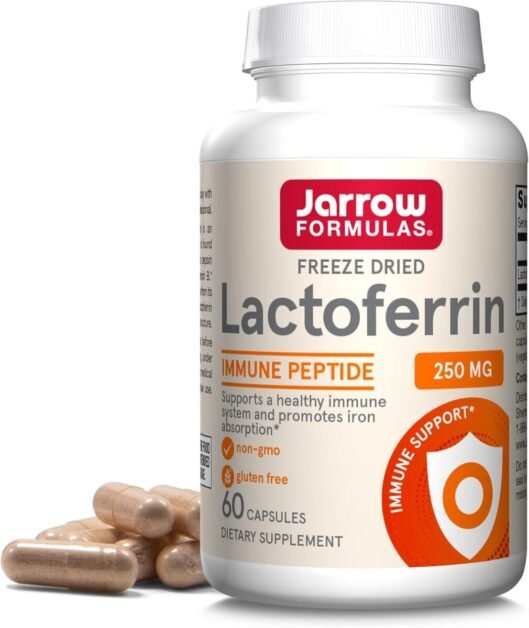

Lactoferrin is known for more than just fighting bacteria and viruses. It also has strong anti-cancer effects. This makes it a hopeful supplement for dogs with cancer.
- Lactoferrin can stop cancer cells from growing and spreading in dogs.
- It boosts the immune system to fight cancer cells better.
- It also has anti-inflammatory effects, which can ease cancer treatment side effects.
Lactoferrin does more than fight cancer. It can help with diarrhea, liver issues, anemia, and more in dogs.
“Lactoferrin is an incredible natural compound that holds immense promise for dogs with cancer and a wide range of other health issues,” says Dr. Sarah Johnson, a veterinary oncologist. “Its unique properties make it a valuable addition to any pet’s cancer-fighting regimen.”
As pet owners look for the best cancer-fighting supplements, lactoferrin is becoming a top choice. Its health benefits and scientific support make it a game-changer for dogs with cancer.
CBD
Research on cannabis is growing, and CBD is getting attention from pet owners and vets. This hemp-based compound might help with symptoms of dog cancer. It could ease pain, boost appetite, and even fight cancer cells.
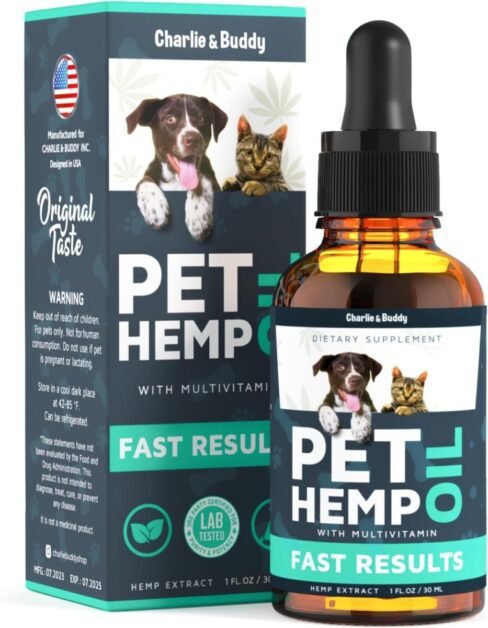

Harnessing the Power of CBD
Dogs have more CB1 receptors in their brains than humans, making them respond well to CBD. This substance can help kill cancer cells and slow down their growth. When used with some medicines, like vincristine, it can fight different types of dog cancer.
Navigating the Regulatory Landscape
Vets in the US and Canada can’t recommend or give out cannabis or CBD. But, they can teach about safe use and where to find regulated products. Many vets now see CBD as part of caring for dogs with cancer.
But, there are big challenges with CBD, like rules and quality issues. It’s important to talk to a vet and choose safe, quality CBD for your dog with cancer.
“CBD has shown a significant decrease in the reproduction of cancer cells in canine osteosarcoma, lymphoma, and mammary carcinoma. Combining CBD with certain chemotherapy agents increased cancer cell death in various types of canine cancer.”
As vets learn more about CBD, pet owners should stay updated. Working with vets and using this supplement can help with dog cancer care.
Supplements for dogs with cancer
Supplements can be a big help for dogs with cancer, but we must be careful. Some supplements, like high-dose omega-3s, can upset a dog’s stomach if added too quickly. Always talk to your vet before giving your dog any supplements. This is because some supplements might not mix well with cancer treatments like chemo or radiation.
Potential Side Effects and Precautions
- High-dose omega-3 fatty acids may cause gastrointestinal issues if not introduced gradually.
- Certain supplements, such as those containing St. John’s Wort, may interact with chemotherapy medications.
- Supplements like turmeric and green tea extract can have blood-thinning effects, which may be a concern for dogs undergoing surgery.
- Some herbs, such as echinacea, may stimulate the immune system, which could potentially interfere with immunosuppressive cancer treatments.
Combining Supplements with Conventional Treatments
When a vet supervises and combines supplements with regular treatments, they can help a lot. They can make your dog feel better, live better, and might even help them live longer. But remember, supplements should never replace the treatments your vet recommends. Always work closely with your vet to make sure supplements are safe and work well with your dog’s cancer treatment.
“The use of dietary supplements and complementary alternative medicine (CAM) is increasingly common for cancer treatment in veterinary health, mirroring trends seen in human medicine.”
Real-Life Success Stories
Dog owners who’ve used supplements for their pets during cancer treatment share inspiring stories. These success stories of supplements for canine cancer show how supplements can help in fighting cancer. They offer hope and support to others facing similar situations.
Denise Tupman from Terrace, British Columbia, gave her eight-year-old Border Collie, Rook, chaga mushroom supplements when he got prostate cancer. Doctors said he had only 10 months left, but Rook lived over a year longer with the supplements.
In Denver, Colorado, Sarah Wilkins used dog owner’s experience with supplements for cancer on her Golden Retriever, Luna, who had lymphoma. Adding turmeric golden paste to Luna’s daily routine helped her eat better and feel more energetic. This made her life better during her fight against cancer.
“The supplements truly made a difference in Rook and Luna’s wellbeing. It gave us more precious time together, and I’m grateful for that.”
These stories show how natural supplements can help dogs with cancer. They offer hope and inspiration to other pet owners going through tough times.
Choosing Quality Supplements
When picking supplements for a dog with cancer, it’s key to go for top-notch, trusted products. Look for organic, ethically-sourced ingredients, good manufacturing practices, and third-party testing. This ensures the supplements are pure and potent.
Some top brands for pet supplements include:
- Life Gold
- I’m-Yunity
- Pet Wellbeing
By consulting with a vet and researching, pet owners can find the best supplements for their dogs. These supplements are vital for supporting a dog’s health during cancer treatment.
Factors to Consider When Selecting Supplements
When picking supplements for dogs with cancer, look for products that:
- Use organic, ethically-sourced ingredients
- Follow good manufacturing practices
- Have third-party testing for purity and potency
Reputable Brands and Products
Some top brands for pet supplements include:
| Brand | Products |
|---|---|
| Life Gold | Comprehensive cancer support formula, immune-boosting supplements |
| I’m-Yunity | Medicinal mushroom supplements, antioxidant blends |
| Pet Wellbeing | Herbal supplements for cancer, liver support, pain relief |
Working with a vet and researching can help pet owners find the best supplements. This way, they can add these natural therapies to their dog’s cancer treatment plan with confidence.
- ✅ BETTER QUALITY OF LIFE. Are you concerned about your pet’s quality of life? Outward signs of discomfort, anxiety, and …
- ✅ IMMUNE SUPPORT. Vet-strength herbal formula supports your dog’s immune system and overall health and vitality. It real…
- ✅ PROTECTION. Life Gold herbal ingredients provide antioxidant support that help protect your dog from oxidative stress …









- Helps maintain immunity for prevention of immunocompromising illness
- Created with high-potency medicinal mushrooms
- Veterinary researched and tested









- Quality and Safety: 1) Tested to comply with heavy metal, pesticide and microbial safety standards. 2) 100% Vegetarian c…
- Suggested Use: For animals, take 100mg per 1kg of body weight per day with water or with wet pet food. You may also take…
- Clinically Proven Key Benefits and Effects: Used as an adjunct health supplement to maintain optimal immune health after…









Working with Your Veterinarian
Working with your vet is key when adding supplements to your dog’s cancer treatment. Vets are important because supplements can affect other treatments and might have side effects. They can guide you on the best supplements, how much to give, and when to give them.
Importance of Veterinary Supervision
It’s crucial to work with your vet when using supplements for your dog with cancer. They know which supplements are good, how they work with other treatments, and the right amount to give. This ensures supplements are used safely and work well with your dog’s care plan.
Integrating Supplements into Your Dog’s Treatment Plan
Your vet can make adding supplements to your dog’s cancer treatment easy. They know how to time supplements with other treatments like chemo, radiation, surgery, or palliative care. This way, supplements help support your dog’s health during their cancer journey. Together, you and your vet can create a full plan to help your dog.
“Nearly fifty supplements have been excluded by Dr. Demian Dressler, author of The Dog Cancer Survival Guide, due to various reasons, including potential interference with primary therapies, unconvincing evidence, bioavailability issues, safety concerns, and batch variability.”
Dr. Dressler says it’s important to use only supplements backed by science and proven safe. Your vet can guide you through the many options. They help pick supplements that are safe and right for your dog.
By working with your vet, you can make a full plan to support your dog’s health during cancer treatment. Adding supplements with your vet’s advice can be a big help in your dog’s care.
- Demian Dressler
- Susan Ettinger









Conclusion
Getting a diagnosis of cancer in your dog can feel overwhelming. But, supplements can be a big help in supporting their health during treatment. Supplements like omega-3 fatty acids, medicinal mushrooms, CBD, turmeric, and traditional Chinese herbal formulas can boost the immune system and reduce inflammation. They might even help stop tumors from growing.
But, it’s important to talk to your vet before starting any supplements. They can help pick the right ones for your dog and make sure they’re safe with other treatments.
Many dog owners change their pet’s diet or add supplements after a cancer diagnosis. Most turn to their vets for advice. After diagnosis, more owners start making their own pet food, but they don’t change their use of commercial diets much. Supplements, especially those for joint health, are often given to dogs with cancer before and after diagnosis.
By taking a full, integrative approach with supplements for dog cancer and natural support for canine cancer, you can help your dog a lot. With your vet’s help, you can make the best choices for your pet’s care. This way, you can improve their life quality and overall health during a tough time.
























